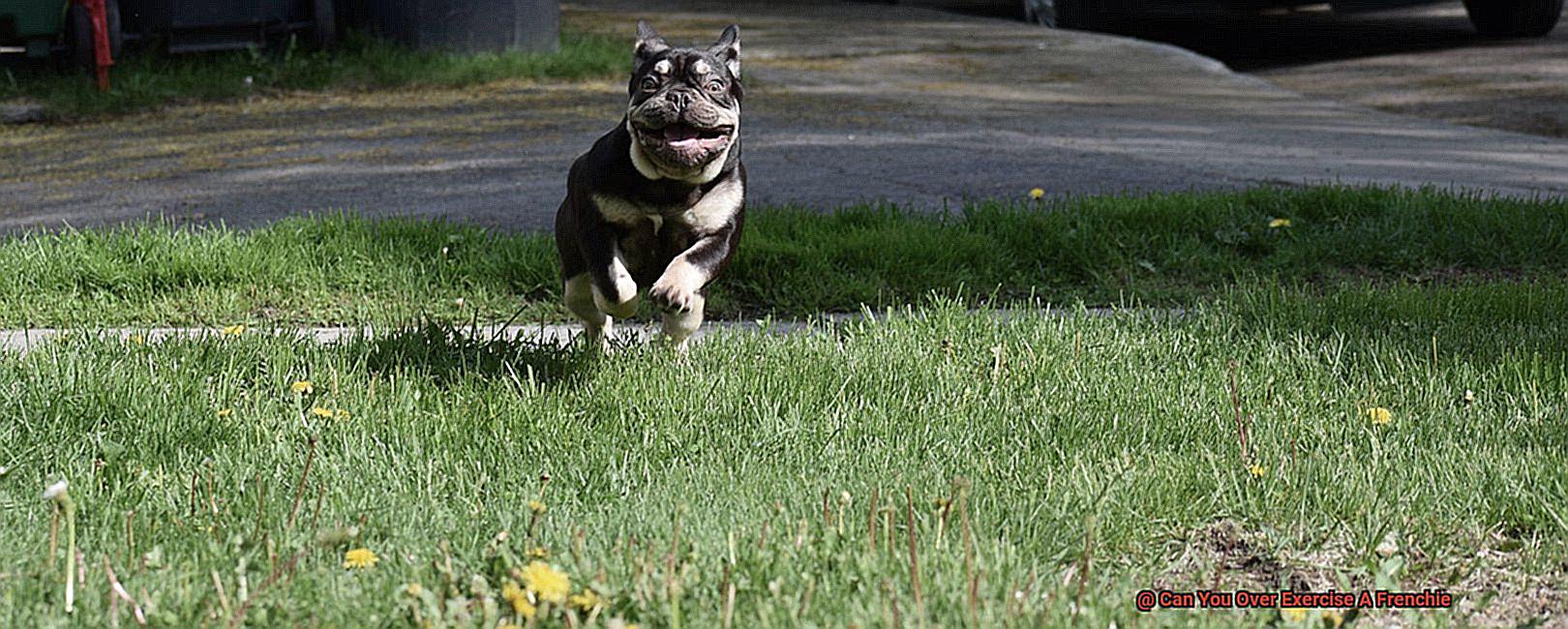Can You Over Exercise A Frenchie?
Today, we’re tackling an intriguing question that concerns the well-being of our beloved French Bulldogs: Can you over exercise a Frenchie? These adorable little bundles of energy may seem unstoppable, but finding the right balance is key. In this blog post, we’ll explore the potential risks of pushing our Frenchies too hard, reveal the perfect workout dose, and uncover what could happen if we neglect their exercise needs. So buckle up, friends, and let’s embark on this educational journey.
French Bulldogs, or Frenchies as we affectionately call them, are known for their playful nature and unique physical attributes. It’s important to help them maintain a healthy weight and an active lifestyle for their overall happiness. However, it’s crucial to remember that moderation is key when it comes to exercising these delightful pooches.
While daily physical activity is essential for French Bulldogs, they do have their limits. Their adorable smushed snouts and compact bodies make them susceptible to overheating and breathing difficulties that can worsen with excessive exercise. That’s why finding the right balance between keeping them active and avoiding potential health risks is vital.
So how much exercise is appropriate for our furry friends? Well, typically around 20-30 minutes split into two or three short sessions throughout the day is ideal. This can include leisurely walks, engaging playtime sessions, or even moderate games of fetch. Matching their exercise routine with their age, fitness level, and any pre-existing health conditions they may have is crucial.
Now let’s dive into the potential dangers of over-exercising our French Bulldogs. One significant risk is overheating since their short noses make it challenging for them to regulate body temperature efficiently. Intense or prolonged exercise can quickly become overwhelming for these pups and lead to heatstroke or exhaustion.
Another danger lies in the strain excessive exercise can put on their joints and bones. French Bulldogs are prone to orthopedic conditions like hip dysplasia, patellar luxation, and intervertebral disc disease. Pushing them beyond their limits may worsen these conditions or even cause new injuries.
So there you have it, friends. While it’s crucial to keep our Frenchie pals active and engaged, we must also be mindful of their limitations. Finding the right balance between exercise and rest is key to ensuring their health and happiness. So let’s give our Frenchies the love they deserve

Exercise Needs and Limitations of French Bulldogs
Contents
- 1 Exercise Needs and Limitations of French Bulldogs
- 2 The Dangers of Overexercising a Frenchie
- 3 How Much Exercise Does a Frenchie Need?
- 4 Monitoring Your Frenchie During Exercise
- 5 Avoiding High-Intensity Activities for French Bulldogs
- 6 Mental Stimulation for Frenchies
- 7 Tips to Keep Your Frenchie Fit and Healthy
- 8 Consulting with Your Veterinarian
- 9 Conclusion
French Bulldogs, or “Frenchies,” are adorable and affectionate companions with unique exercise needs and limitations. As a responsible pet owner, it is essential to understand how to provide the right amount and type of exercise to keep your Frenchie fit, mentally stimulated, and safe. In this blog post, we will explore the exercise needs and limitations of French Bulldogs, offering valuable insights and practical tips for maintaining their well-being.
Understanding the Limitations:
French Bulldogs have a brachycephalic skull structure, which means they have a shortened snout and a flat face. This anatomical characteristic can make breathing challenging, especially during vigorous exercise. It is crucial to be mindful of their limitations to prevent respiratory distress, overheating, and exhaustion.
Exercise Recommendations:
- Duration and Intensity: French Bulldogs benefit from regular exercise of moderate intensity for around 20-30 minutes per day. Short bursts of activity like playing fetch or going for a walk are ideal.
- Weather Considerations: French Bulldogs are sensitive to extreme temperatures, particularly heat. Exercise them during cooler parts of the day, provide shade, and always carry fresh water to prevent heatstroke.
- Mental Stimulation: Alongside physical exercise, mental stimulation is vital for French Bulldogs. Engage them in interactive games, puzzle toys, or short training sessions to keep their minds sharp and prevent boredom.
- Monitoring Signs of Fatigue: French Bulldogs may not always show obvious signs of exhaustion. Keep an eye out for excessive panting, drooling, or struggling to breathe. If you notice any of these signs, it’s time to rest.
Consulting with a Veterinarian:
Every Frenchie is unique, so it’s important to consult with your veterinarian regarding their specific exercise needs. Factors like age, weight, overall health, and any pre-existing conditions should be considered. Your vet will provide expert guidance on the duration, intensity, and type of exercise that suits your Frenchie’s requirements.
The Dangers of Overexercising a Frenchie
French Bulldogs are undeniably adorable, with their wrinkly faces and compact bodies. But did you know that their unique anatomy makes them more susceptible to certain health risks when it comes to exercise? In this section, we’ll explore the potential dangers of overexercising a Frenchie and why it’s important to tailor their exercise routines to their individual needs.
Respiratory Issues: Handle with Care
One of the most significant dangers of overexercising a Frenchie is the strain it puts on their respiratory system. Being a brachycephalic breed with flat faces and shortened airways, Frenchies already have difficulty breathing, especially during strenuous activities. Pushing them too hard can lead to respiratory distress and even collapse. It’s essential to be mindful of their breathing patterns and give them frequent breaks during exercise.
Heat Exhaustion: Keep Cool, Stay Safe
Another danger that French Bulldogs face is heat exhaustion or heatstroke. Due to their shortened airways, they struggle to regulate their body temperature efficiently. This makes them highly susceptible to overheating, which can quickly become life-threatening if not treated promptly. It’s crucial to exercise them during cooler times of the day, provide plenty of water, and avoid exercising in extreme heat.
Joint and Bone Problems: Handle with Care
French Bulldogs are prone to joint and bone problems, such as hip dysplasia or patellar luxation. Overexercising can exacerbate these conditions and cause long-term damage. Their compact bodies put extra strain on their joints, making it essential to avoid high-impact activities or excessive jumping. Opt for low-impact exercises like walking or swimming instead.
Muscle Injuries: Know Their Limits
While French Bulldogs may look muscular, they are more prone to muscle strains, sprains, or even tears compared to larger breeds. Their muscular structure is not as robust, making them more susceptible to injuries when pushed beyond their limits. It’s crucial to recognize their individual limitations and avoid excessive or intense exercise that could lead to these injuries.
Exercise-Induced Collapse: Watch Out for Warning Signs
Some French Bulldogs may suffer from exercise-induced collapse (EIC), a condition characterized by weakness, tremors, and sometimes collapse after intense physical activity. Overexercising can trigger these episodes, causing distress and potential harm to the dog. It’s important to be aware of your Frenchie’s limits and seek veterinary guidance if you notice any concerning symptoms.
Mental Fatigue: Rest and Recharge
Finally, it’s essential to consider mental fatigue when it comes to exercising a Frenchie. These dogs are prone to becoming easily overwhelmed or stressed, and excessive exercise without adequate rest can lead to emotional burnout or behavioral issues. Regular breaks and shorter exercise sessions can help prevent mental exhaustion and ensure your Frenchie’s well-being.
How Much Exercise Does a Frenchie Need?

French Bulldogs, also known as Frenchies, are adorable little dogs with a big personality. They are playful, energetic, and love to have a good time. But how much exercise do they actually need? As an expert in all things Frenchie, I’m here to give you the scoop.
Age Matters: From Puppies to Adults
Just like humans, French Bulldogs have different exercise needs depending on their age. Puppies have boundless energy and require shorter bursts of playtime throughout the day. As they grow older, their exercise needs will change. Adult Frenchies typically need around 30 minutes to 1 hour of exercise per day. This can be divided into multiple shorter sessions to keep them engaged and active.
Health Comes First: Consider Their Condition

When it comes to exercise, it’s important to consider your Frenchie’s health condition. French Bulldogs are brachycephalic dogs, which means they have a short snout that can make breathing difficult. This makes them more prone to overheating and exhaustion, especially in hot weather or during intense physical activity. So, while it’s crucial to provide regular exercise for your Frenchie, it’s equally important to monitor their activity levels and avoid overexertion.
Individual Preferences: Tailoring the Routine
Just like humans, every Frenchie is unique and may have different preferences when it comes to exercise. Some Frenchies may be more active and require additional exercise, while others may have certain health conditions that limit their physical activity. It’s always best to consult with a veterinarian to determine the appropriate exercise routine for your individual Frenchie.
Mental Stimulation Matters Too.
Exercise isn’t just about physical activity for French Bulldogs; mental stimulation is equally important. Frenchies are intelligent dogs that thrive on interactive games, puzzle toys, and training sessions. These activities not only provide physical exercise but also keep their minds sharp and prevent boredom.
Listen to Your Frenchie’s Body
During exercise, it’s crucial to pay attention to your Frenchie’s body language and signs of exhaustion or discomfort. If your Frenchie is panting excessively, struggling to breathe, or showing signs of fatigue, it’s important to provide them with a rest and ensure they have access to fresh water. Safety always comes first.
Monitoring Your Frenchie During Exercise
We all know how important exercise is for our four-legged friends. Not only does it keep them physically fit, but it also helps burn off some of that endless energy they seem to have. But as responsible pet owners, it’s crucial that we monitor our Frenchies during exercise to ensure their safety and well-being. Let’s dive into why monitoring is so important and some tips for doing it effectively.
Why Monitoring Matters
Our beloved French Bulldogs are brachycephalic, which means they have those adorable squished faces that we all love. However, this cute characteristic can also make them prone to breathing difficulties and overheating during exercise. That’s where monitoring comes in.

By keeping a close eye on our Frenchies while they’re getting their exercise on, we can ensure they don’t overexert themselves. Signs of overexertion may include excessive panting, difficulty breathing, excessive drooling, or even collapsing. Yikes. We definitely want to avoid that.
Tips for Effective Monitoring
Now that we understand the importance of monitoring, let’s talk about some practical tips to help us keep our Frenchies safe and happy during exercise.
- Use a Heart Rate Monitor: Consider investing in a heart rate monitor for your Frenchie. This nifty device will help you keep track of their heart rate and ensure it stays within a safe range.
- Watch Their Body Language: Pay close attention to your Frenchie’s body language during exercise. If they start to slow down, lag behind, or show signs of fatigue, it may be time to take a break or end the exercise session. They’re not machines, after all.
- Mind the Weather: Frenchies are susceptible to heatstroke, so be mindful of the weather conditions when exercising them. Avoid extreme heat or humidity and opt for early morning or late evening walks when temperatures are cooler.
- Hydrate, Hydrate, Hydrate: Just like us, our Frenchies need to stay hydrated during exercise. Bring water with you on walks or provide access to water during playtime. Encourage your Frenchie to drink regularly and keep those tails wagging.
- Gradually Increase Intensity: Start slow and gradually increase the intensity and duration of your Frenchie’s exercise routine. This will help prevent overexertion and reduce the risk of injury. Rome wasn’t built in a day, and neither should your Frenchie’s exercise routine.

So there you have it, folks. By following these monitoring techniques and listening to your Frenchie’s cues, you can ensure they stay safe and healthy while enjoying their daily dose of exercise. Remember, our Frenchies rely on us to keep them out of harm’s way, so let’s be vigilant and give them the love and care they deserve.
Avoiding High-Intensity Activities for French Bulldogs
French Bulldogs are adorable and lovable companions that bring joy to our lives. However, they have a unique body structure that makes them prone to certain health issues. In this blog post, we will discuss why it is important to avoid high-intensity activities for French Bulldogs and provide tips on low-impact exercises that are suitable for them.
Understanding the Unique Needs of French Bulldogs:
Respiratory Problems:
French Bulldogs have a brachycephalic skull shape, which means they have shortened airways. This can lead to breathing difficulties, especially during high-intensity activities that require increased oxygen intake. Engaging them in strenuous exercise can put excessive strain on their respiratory system and worsen their breathing issues.
Joint Disorders:
Another common health concern in French Bulldogs is joint disorders, such as hip dysplasia and patellar luxation. These conditions can cause pain and discomfort, making high-impact activities like running or jumping particularly risky for their joints.
The Importance of Low-Impact Exercises:
Short Walks:
Taking your Frenchie for short walks is a great way to provide exercise without putting too much strain on their bodies. Aim for several short walks throughout the day, focusing on a moderate pace that keeps them active but not overly exerted.
Swimming:
Swimming is an excellent low-impact exercise for French Bulldogs as it provides a full-body workout without stressing their joints. Ensure they have a life jacket for safety and gradually introduce them to water if they are not accustomed to swimming.
Controlled Fetch:
Playing fetch in a controlled environment, such as a fenced backyard or an indoor space, allows your Frenchie to engage in physical activity while minimizing the risk of injuries. Use soft toys or balls to prevent any potential harm.
Monitoring Your Frenchie’s Well-being:
Signs of Fatigue or Discomfort:
During exercise, closely monitor your Frenchie for signs of fatigue or discomfort. Excessive panting, difficulty breathing, or limping are indications that they may be pushing their limits. If you notice any of these signs, stop the activity immediately and provide them with rest and water.
Regular Vet Check-ups:
Regular visits to the veterinarian are essential for assessing your Frenchie’s overall health and condition. Your vet can provide guidance on the appropriate level of exercise based on their specific needs.
Mental Stimulation for Frenchies
As an expert in French Bulldogs, or as we affectionately call them, Frenchies, I understand the importance of mental stimulation for these intelligent and playful pups. While physical exercise is crucial, mental stimulation is equally essential to keep them happy and prevent behavioral issues. In this section, I will share my expertise on various ways to provide mental stimulation for your beloved Frenchie.
Interactive Toys: Keeping Those Tails Wagging
One of the simplest and most effective ways to stimulate your Frenchie’s mind is through interactive toys. These toys are specially designed to challenge their problem-solving skills and keep them entertained for hours on end. Puzzle toys, for example, can be filled with treats or small toys that your Frenchie has to figure out how to access. Not only does this engage their minds, but it also provides a reward system that reinforces positive behavior.
Obedience Training: Sharpening Their Minds
French Bulldogs can be quite stubborn at times, so regular obedience training sessions are a must. Training helps keep their minds focused and disciplined while teaching them important commands. Basic commands such as sit, stay, and come can be taught using positive reinforcement techniques like treats or praise. Remember, short and frequent training sessions are key to maintaining their interest and preventing boredom.
Socialization: Expanding Their Horizons
Socialization is crucial for mental stimulation in French Bulldogs. Exposing them to different environments, people, and other animals broadens their horizons and keeps their minds active. Taking them to dog parks or enrolling them in obedience classes provides opportunities for social interaction and mental stimulation. Plus, playdates with other dogs allow them to engage in natural dog behaviors, such as chasing and wrestling, which further stimulates their minds.
Interactive Playtime: Fun and Mental Stimulation Combined
Engaging in interactive playtime with your Frenchie is another fantastic way to provide mental stimulation. Playing games like hide-and-seek or fetch not only helps burn off excess energy but also challenges their problem-solving skills. For example, you can hide treats around the house or in puzzle toys, encouraging them to use their senses to locate the hidden treasures. Trust me, watching their little tails wag with excitement as they find the hidden goodies is priceless.
Scent Work: Unleashing Their Superpower
French Bulldogs have an incredible sense of smell, and incorporating scent work into their routine can provide excellent mental stimulation. Hide treats or objects with specific scents for them to find. Start with simple hiding spots and gradually increase the difficulty level as they become more skilled. It’s fascinating to see their superpower in action as they sniff out the hidden treasures.
Tips to Keep Your Frenchie Fit and Healthy
French Bulldogs, or “Frenchies,” are adorable and playful companions. However, it’s important to provide them with the right amount of exercise to keep them happy and healthy. In this article, we’ll explore some tips to help you keep your Frenchie fit and ensure they stay in top shape.
Understanding Your Frenchie’s Exercise Needs:
Every Frenchie is unique, so it’s important to know their exercise requirements. Frenchies have short snouts, which means they may have difficulty breathing during exercise. Start with shorter sessions of low-impact exercises like walks or gentle playtime and gradually increase the duration and intensity as they build stamina.
Avoid Overexertion:
While exercise is crucial, be mindful not to overdo it. French Bulldogs can easily become exhausted or overheat due to their brachycephalic skull structure. Watch out for signs of fatigue, excessive panting, or difficulty breathing. If you notice these signs, give your Frenchie a break and ensure they have access to water to cool down.
Heat Sensitivity:
Frenchies are sensitive to heat, so it’s essential to avoid exercising them during the hottest parts of the day. Opt for early morning or late evening workouts when temperatures are cooler. Provide shade and fresh water during exercise to prevent overheating.
Mental Stimulation:
French Bulldogs are intelligent dogs that thrive on mental challenges. Incorporate interactive toys, puzzle games, and short training sessions into their routine to keep their minds sharp and prevent boredom. Mental stimulation can tire them out without excessive physical exertion.
Weight Management:
Obesity is a common health issue in Frenchies that can lead to various problems. Monitor your Frenchie’s weight and consult with your veterinarian about a balanced diet and appropriate exercise routine. Regular exercise coupled with a healthy diet can help maintain their weight and overall well-being.
Regular Vet Check-ups:
Regular veterinary check-ups are vital to monitor your Frenchie’s health and address any potential issues. Your vet can provide personalized recommendations regarding exercise and diet based on your Frenchie’s specific needs.
Consulting with Your Veterinarian
So, you’ve got a French Bulldog and you’re ready to get them moving and grooving. But before you lace up your sneakers, it’s crucial to consult with your veterinarian to ensure your Frenchie’s exercise routine is safe and tailored to their specific needs. In this blog post, we’ll dive into the importance of veterinary guidance, the unique exercise considerations for Frenchies, and how to develop a plan that keeps them healthy and happy.
The Brachycephalic Breeds – What You Need to Know:
French Bulldogs are part of the brachycephalic breeds, which means they have shortened snouts and airways that can be compromised. This can make them more susceptible to respiratory issues and overheating during exercise. Consulting with your veterinarian allows them to assess your Frenchie’s overall health and provide recommendations on the appropriate level of exercise.
Tailoring Exercise to Your Frenchie’s Needs:
Every Frenchie is unique, so it’s important to consider factors such as age, weight, and any pre-existing medical conditions when developing their exercise routine. Your veterinarian may recommend specific types of exercise that are better suited for Frenchies, such as short walks, gentle play sessions, or swimming. They can guide you in finding the right balance between providing enough physical activity to keep them healthy and fit, while also not pushing them beyond their limits.
Signs to Watch Out for During Exercise:
During exercise, it’s crucial to keep a close eye on your Frenchie for any signs of fatigue, difficulty breathing, or overheating. If you notice any concerning symptoms, it’s essential to stop the activity immediately and seek veterinary attention. Overexercising a Frenchie can lead to exhaustion, heatstroke, or exacerbation of existing health issues.
Regular Check-ups for Optimal Health:
Regular check-ups with your veterinarian are essential for your Frenchie’s overall well-being. These visits allow your vet to monitor their health and ensure that their exercise routine is appropriate for their individual needs. Your veterinarian can also provide additional guidance on nutrition, weight management, and any necessary modifications to the exercise plan as your Frenchie ages.
Educate Yourself for Informed Decision-Making:
In addition to consulting with your veterinarian, it’s helpful to educate yourself about the specific exercise requirements and limitations of the Frenchie breed. This knowledge will enable you to make informed decisions regarding their exercise routine and ensure their safety.
Em5WE9QFfa0″ >
Conclusion
In conclusion, it is crucial to acknowledge that over exercising a Frenchie can have detrimental effects on their health and well-being. These adorable little dogs may seem energetic and eager to play, but they have specific limitations due to their unique anatomy and breed characteristics. Pushing them beyond their limits can lead to serious consequences.
Excessive exercise can put strain on a Frenchie’s joints, which are already prone to issues such as hip dysplasia and patellar luxation. Their short muzzles also make it difficult for them to regulate their body temperature efficiently, putting them at risk of overheating during intense physical activity.
While it’s important to provide regular exercise for your Frenchie to keep them fit and mentally stimulated, moderation is key. Short walks and gentle play sessions are ideal for these dogs. Avoid activities that involve high impact or prolonged exertion.
Remember, every dog is different, so it’s essential to monitor your Frenchie’s behavior and consult with a veterinarian about the appropriate amount of exercise for your individual pet. By striking the right balance between physical activity and rest, you can ensure that your Frenchie stays healthy, happy, and free from the risks associated with overexertion.
So let’s cherish our furry friends’ unique qualities while respecting their limitations.




